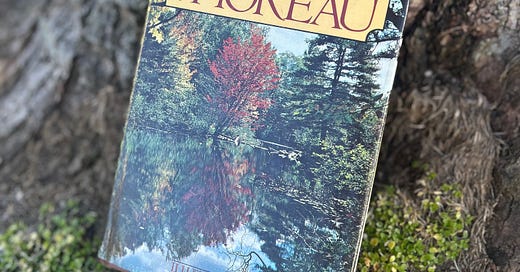March/April 2025 read-along pick: Walden by Henry David Thoreau
Because I can't walk Walden Pond Path otherwise
Have you ever read a personal account of someone who has intentionally set out to live more simply, freely, and unencumbered by society at large?
Walden: Life in the Woods is Henry David Thoreau’s most famous work and I am planning to read through it in the most practical (and attainable) way possible for me at my current capacity: slowly, deliberately, and over the course of not one but two months.
Considering the month of March is nearly halfway over and I have yet to make it through the first chapter (which consists of 90 pages), I think this is wise.
Each morning I am reading as many pages as my cup of coffee holds out for—and I have found that this meandering sort of pace will serve me best for this specific book; Walden does not feature the sort of prose one can breeze through.
Admittedly, it has been a challenge to read so far, as Thoreau does tend to ramble in ways I have yet to fully comprehend. I am still learning his humor and his sincerity; they are not so easily distinguishable for me. I do believe that my upcoming trip to Concord, Massachusetts is enough to pull me through, however, and I suspect that by the end of Walden I will be able to see how friendship and theology effortlessly blossomed between Thoreau, Amos Bronson Alcott, and Ralph Waldo Emerson. (I’ve become fond of Emerson’s essays, particularly “Self-Reliance.”)
In short, Walden is an account of Thoreau’s time living in a self-built, secluded cabin along the shore of Walden Pond in Concord, Massachusetts. The experiment lasted two years and two months and the first edition of Walden was published in 1854. The original cabin no longer stands, but the replica is enough to pique my literary interests.
The closest creative, non-fiction prose I’ve read to Thoreau is (probably) Annie Dillard’s Pilgrim at Tinker Creek, in which she quietly, intentionally, and on-foot explores the creek near her home within Virginia’s Blue Ridge Mountains. One minute you are reading—in great detail—about the (slightly disturbing) sex life of a stylops, the next you are contemplating just how exactly parasitism is “a sort of rent, paid by all creatures who live in the real world with us now” and outright predators are more easily comprehensible (and perhaps preferable) in matters of life and death. 1
Dillard easily blends the world of theology with her observations of nature at work, and I expect this is what I will encounter with Thoreau—an awareness of the divine in a blade of grass.
Of course, no one better than Thoreau himself can explain exactly what he set out to do:
“I went to the woods because I wished to live deliberately, to front only the essential facts of life, and see if I could not learn what it had to teach, and not, when I came to die, discover that I had not lived. I did not wish to live what was not life, living is so dear; nor did I wish to practice resignation, unless it was quite necessary. I wanted to live deep and suck out all the marrow of life, to live so sturdily and Spartan-like as to put to rout all that was not life, to cut a broad swath and shave close, to drive life into a corner, and reduce it to its lowest terms, and, if it proved to be mean, why then to get the whole and genuine meanness of it, and publish its meanness to the world; or if it were sublime, to know it by experience, and be able to give a true account of it in my next excursion.”
— Henry David Thoreau, Walden
Again, I don’t believe this is a work to consume large portions of at a time, but rather small bites each day.
(I am also staring down a pile of library holds and Book of the Month picks I want to tackle in the late afternoons and evenings over the course of the next couple months, so the extra time to read Walden is warranted in more ways than one.)
So if you are feeling ambitious this spring, consider joining me on meandering journey through the world of Walden. A copy is easily accessible via Project Gutenberg and I think this time of year is especially appropriate to read some insightful, nature-centered prose. In my little corner of the world, the earth is waking up to the promise of spring; I’d like my reading to do just the same.
Dillard, A. Pilgrim at Tinker Creek. New York: Harper's Magazine Press, 1974.





I love Walden. I've loved it for over a decade and revisit it every now and then. Perhaps I should visit it again over my morning tea as well.